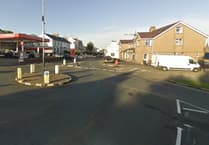Civil servants have candidly expressed their frustration about the lack of investment in the island’s public right of way footpaths.
His petition was picked up by Douglas South MHK Sarah Maltby, who chaired the committee alongside members Daphne Caine, MHK for Garff, and Robert Henderson MLC.
When asked if the DoI had enough resources to maintain the network of paths, director of highway services Jeff Robinson said: ’In a word, no.
’We would love to maintain the network to a much higher standard, [but] budgets have been slashed since 2010 in terms of revenue.
’The number of internal staff that we have has gone down by hundreds in that same period.
’And where we do have resources, it’s increasingly difficult to spend it - and it takes management skills to get through the government procedures and to spend it effectively, and we don’t have those resources with the skills internally either and we find it very hard to recruit into those positions.’
Describing it as ’a difficult place we are in’, he explained that ’when budgets were cut around 2010 it was implicitly accepted that the department would have to reduce spending in the countryside in order to focus on keeping the road network functioning’.
To illustrate this, Mr Robinson said that in terms of revenue expenditure the highways department had gone from around £12 million down to about 1.5 million over the past ten years - though this had been somewhat compensated by capital expenditure.
In the past year, £191,000 went on staffing costs for a team of five, and £170,000 on the actual maintenance - which Mr Robinson explained mostly involved the management of deterioration ’events’ like the collapse of a footbridge or a path falling into a stream, rather than the day to day maintenance of paths.
The DoI’s aim was to give each path at least one cut [of vegetation] per year, with the exception of the Douglas-Peel heritage trail and the Raad-ny-Foillan which receive more regular maintenance, the latter of which’s three annual cuts cost £70,000.
Mr Robinson said the money spent on the Raad-ny-Foillan, which was ’relatively simple’ to maintain considering it was mostly open grassland and moorland rather than lined hedgerows, gave an idea of ’the scale of the costs’.
funding
He explained that the DoI was unable to give local authorities funding to cut the paths in their constituencies (with some of them having taken this task upon themselves with ratepayer funding), as no ’pot of money’ existed to give to them.
He said: ’If we had more money, we would be doing more maintenance.’
Civil maintenance manager Alan Harding noted that after payroll of the money spent on the Raad-ny-Foillan there was ’very little left to do any other work’, adding that it was ’pure lack of resource, lack of funding that we can’t do more than we’re doing at this moment in time’.
Also mentioned in the hearing was the volunteer group Footpath Friends (established by Bill Dale, founded of beach-cleaning charity Beach Buddies), which was awarded a three-year £75,000 government contract to carry out work on footpaths.
’No disrespect to the voluntary groups, but they’re fairly limited on what they can do - they can do general trimming, but you’ve got to be careful with using equipment, it takes a lot of supervision and management to pull all that together,’ said Mr Harding.
’So it has had some success, but it doesn’t really offset the shortage we’re talking about with the resource and the budget we’ve got.’
Asked what Footpath Friends had achieved, he said ’something’ and that they had ’bridged a gap’ but that it was ’still far short from where we need to be’.
Mr Robinson explained further that they had taken the view that ’we perhaps weren’t getting our value for money from that coordination [with Footpath Friends]’, and that while the work may have looked good initially.
In summary, Mr Robinson said that the department was currently ’failing in its own expectations’ when it came to maintaining the footpaths.
The DoI has a budget of £360,000 per year for this maintenance.
maintenance
Asked how much the DoI thinks it would need to cover the basic maintenance of the paths, highways and public rights of way officer Ffinlo Williams said the initial maths came up with £710,000 (per year) to keep maintenance levels as they are (not improving but stopping deterioration).
An assessment of the Raad-ny-Foillan found that an additional £200,000 would be required to ’do improvement works or get on top of anything that turns up’ - and the department’s policy is to prioritise the iconic coastal path based on its tourism value.
Asked by Mrs Maltby about the committee’s recommendation of having a single division to oversee paths, Mr Robinson said that it would make more legislative sense for this to come under the DoI’s umbrella rather than the Department of Environment, Food and Agriculture.




